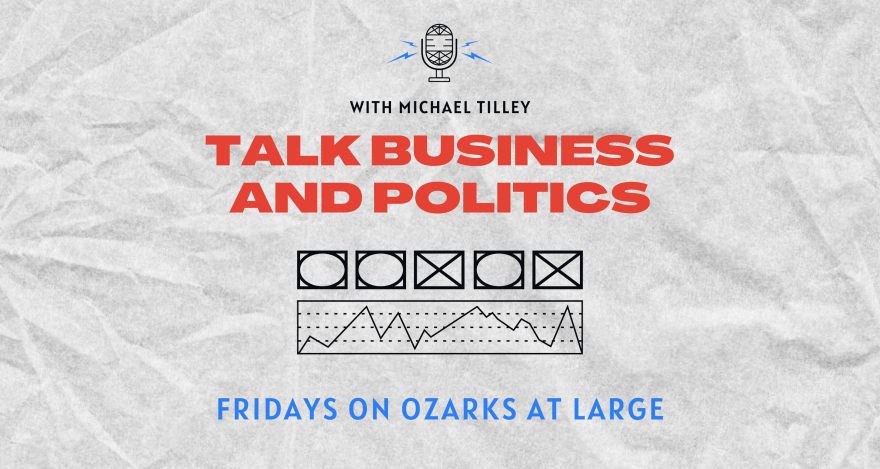Kyle Kellams: It is time to check in with Michael Tilley from his Fort Smith office. Michael is with Talk Business & Politics. You can find them at talkbusiness.net. Michael, welcome back to the show.
Michael Tilley: Hey, thanks for continuing to invite us back.
Kellams: We have talked for a long time about the consent decree, what it means for the city. What is the latest development related to that?
Tilley: Well, and you're right. By long time, it's been over 10 years, believe it or not, that this federal consent decree has been imposed upon the city of Fort Smith because for decades the city wouldn't adequately maintain its sewer system. So the federal government has a problem with you just letting sewer system stuff go into its creeks and waters and people's backyards, and they're pretty narrow minded about that kind of thing.
So voters back in May approved what will be roughly a $360 million plan to address this required consent decree work. And this Tuesday, the first part of that bond — I think they're going to be three bond sales over the next four to six years — went to market. The first bond sale, about $95 million, came in at a lower interest rate than they thought. They were estimating about a 4.8, 4.9% interest rate. And to be clear, that's the cost of the debt that the city has to pay. So it's just like your mortgage, you're going to pay for the cost of the house and the interest. But the interest rate came in at 4.6%.
The financial folks that helped the city manage the bond sale estimate that'll be about a $6 million savings over the 30 years of those bond notes. So you're correct. We have not had much positive to report in the past 10 years about the consent decree reporting. This is kind of a rare headline.
They had a $95 million tranche of bonds to sell, and there was $450 million in demand. That's what helped reduce the interest rate. Obviously they didn't sell $450 million; they could only sell the $95 million. But that gives you an idea of the demand. We've got another two bond sales expected over the next four to six years. Hopefully they'll have some more pleasant rate surprises for those sales.
Kellams: Well, let's continue thinking about the future. A planned $18 million slackwater harbor in Van Buren — it's been some slow waters to get that planning going.
Tilley: Yeah. You know, they say the good Lord giveth and the good Lord taketh away, right? I'm not saying this federal agency is divine by any stretch, but they did authorize in November 2023, they did say, okay, we're going to give you the money for this slackwater harbor.
And before I go any further, it's a key asset that city officials in Crawford and Sebastian counties, Fort Smith and Van Buren, have been pursuing for decades. The simple explanation: it allows port operations to pull these barges into this harbor. They're not on the active river that has currents and traffic. They can pull it off. It's just like having an exit on the interstate. You can pull it off, do the work there, and then put the barges out.
They've been after this for a while, but they're very expensive. You have to have Corps approval and federal approval and all of that. But in November 2023, the Maritime Administration — MARAD, as I've learned they're called — gave them the money.
But now the problem is MARAD wants you to send them all the designs and this kind of thing to get approval. They've done that, but it's taking forever to get that back. You have people like Ashley Harris, she's with Western Arkansas Planning and Development District, and Marty Shell, he's the owner of Five Rivers Distribution, which will manage this slackwater harbor. They've been trying to tell the feds, and they've been working with Congressman Womack, look, the longer you delay approval on this, the more the costs go up, and it just pushes it out further.
So Ann C. Y. — he is the acting administrator of MARAD — was in town this week. He didn’t commit to moving the process along, but he and his staff did say, okay, we know about it, we know where the red tape is, and we're going to try to get it moving. Congressman Steve Womack, from up there in Rogers, was somewhat optimistic that it would hopefully get the project moving.
Marty Shell was… I don't know if he was optimistic. His quote was, it was good to have him here, quote, to see that this thing is real and that we need to quit messing around and get it moving on. But of course, Shell didn't use the word messing around. We took a little editorial privilege and gotcha messing in there instead.
So we will see, hopefully in the next two or three weeks. The other issue is if there's a government shutdown, all bets are off. Shell and Ashley are worried about that as well. But it's just been an $18 million project that's been on hold for a while. Ideally MARAD will move and they can start construction.
Kellams: There are so many responsibilities city government and city officials have for current residents. Turns out there is some discussion in Fort Smith going on, like what responsibility do we have for some of our former residents? I'm talking about those who are buried in Fort Smith.
Tilley: Yeah, cemeteries. The city of Fort Smith already operates one cemetery. And there's Fort Smith Cemeteries Inc., a group of businessmen led by Marty Clarke and Ed Ralston. They tried to take over these cemeteries, try to make them work, but the cemetery model just doesn't work. There's no business model for it.
So long story short, they went to the city back in July, asked the city to look at it. The city came back with a pretty expensive plan that it would cost to take over these cemeteries. We're talking about 50,000 to 55,000 gravesites total among these cemetery operations.
I'm just looking at the top line here. For example, the city proposed a budget with personnel costs around $655,000. Clarke and Ralston came back with one at about $340,000. The city had a one-time new equipment budget of around $940,000. The cemetery folks came back at about $160,000.
What Clarke and Ralston proposed is that the city can outsource this, which is what they're doing now, and cut their capital expenses by more than 80%. They brought this revised budget back to the city in a study session this week.
Director Christina Katsabis has always been a supporter of this. She continues to say the city has a moral and civic obligation to take care of what she called our historical archives. But you have a couple directors worried about setting a precedent. For example, Director Neal Martin said, we don't want everybody thinking we're in the cemetery business — although the city’s already in the cemetery business. A couple directors worried about increased costs over time.
I’ve got to tell you, I was a little naive about this. When this first came up, I thought the city board would be like, yeah, we need to take care of cemeteries. But there's been a lot of pushback. So it'll be interesting to see if and when this gets brought back to a city voting agenda.
Kellams: I want us to continue to follow this because I find this quite an interesting conversation. Finally, it's the Arkansas Oklahoma State Fair taking place. I think it will go through Saturday night. It's been going since last week. You've got acrobats, you've got something called a live shark encounter, you've got truck and tractor pulls, music, Ferris wheel rides. What do we not know about the Arkansas Oklahoma State Fair?
Tilley: Well, you want to know how many? I bet not a lot of folks know how many corn dogs they sell for the nine-day event. I didn't know this, but I'd ask Kelly Clark. He's the volunteer chairman of the fair, an area businessman.
The story was about the economic impact of this fair. He estimates it's around $7 million to $7.5 million. Part of that is, for example, they bring in over 1,600 livestock exhibits. That takes two to three people for each of those exhibits. They had over 1,300 FFA students come in from more than 100 schools and 32 counties in Arkansas and Oklahoma to judge.
You have 135,000 to 250,000 people attend. You have 70 to 80 fair vendors. And according to Clark, most of the food vendors buy their supplies in the area. Those are all examples of what contribute to the economic impact.
But the one thing he kind of threw off as an offhanded comment that I ended up putting in the lead was they talked to the guy that sells corn dogs. He says they sell about 75,000 corn dogs in the nine-day event. That's more than 8,300 a day.
I didn't ask about the favorite condiment for a corn dog, because that would be quite a few gallons of whatever that is. But that's a lot of corn dogs. My problem now is every time I'm going to drive past the fairgrounds, all I'll be able to think about is 75,000 corn dogs.
Kellams: Well, I have a couple of thoughts about this one. The proper condiment with a corn dog is mustard.
Tilley: Yeah, yes it is.
Kellams: I didn't want to risk inflaming the ketchup lobby.
Tilley: Yeah. The ketchup lobby or some crazy barbecue lobby, I don't know. But yes, mustard. Not any fancy — just regular yellow mustard.
Kellams: And hopefully most of those corn dogs are consumed after a ride on the tilt-a-whirl and not before.
Tilley: Oh, yeah. You don't want to eat that corn dog twice.
It is interesting that it's a $7.5 million economic impact. That's not chump change. Mr. Clark was quick to say that's an estimate. They're kind of using what other fairgrounds of their size have said. He talked about how they should really get some folks out to do a thorough economic impact study, but that's their best estimate. I wouldn't be surprised if it's more than $7.5 million, but that's what they're going with now.
Kellams: All right. Well, I think you could probably get a corn dog at Reynolds Razorback Stadium tomorrow when the Razorbacks take on the Notre Dame Fighting Irish. I'm going to call it a Razorback upset.
Tilley: Well, it would be an upset. I've been busy lately, not just on news stories but working on my résumé. I think Mister Pittman can be a coach. I think I'm going to try next. We'll see.
Kellams: All right, Michael.
Tilley: I could use a couple million. Mike, fire me and I'll get the couple million.
Kellams: Michael Tilley is with Talk Business & Politics. Michael, we'll check out my prediction when we talk next week.
Tilley: Well, I hope you're correct.
Kellams: That was Michael Tilley and Ozarks at Large’s Kyle Kellams.
Ozarks at Large transcripts are created on a rush deadline. Copy editors utilize AI tools to review work. KUAF does not publish content created by AI. Please reach out to kuafinfo@uark.edu to report an issue. The audio version is the authoritative record of KUAF programming.








